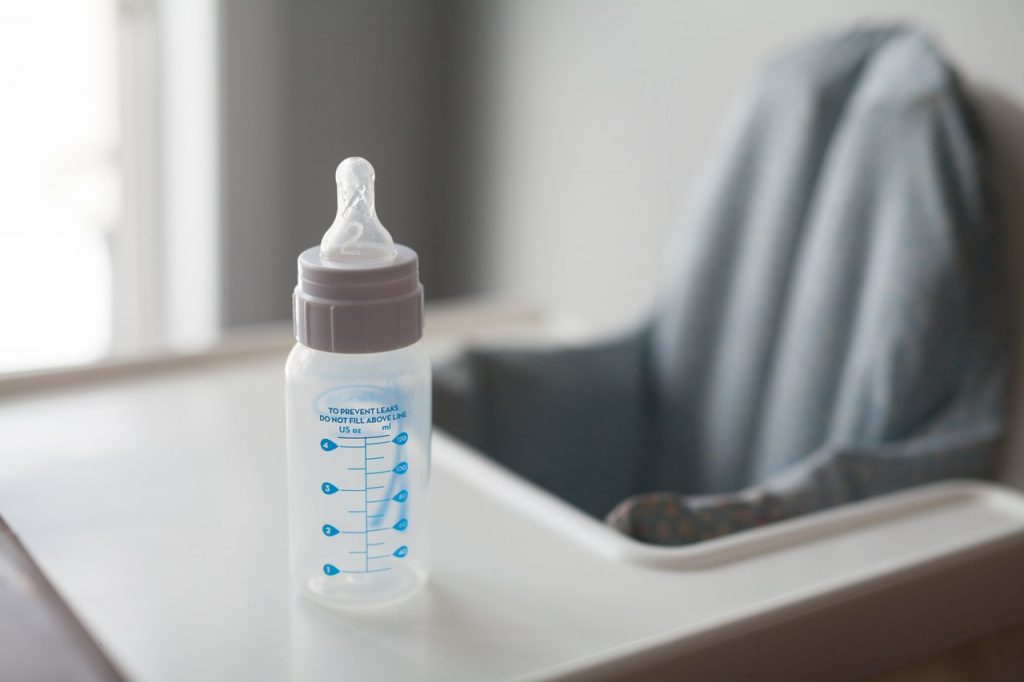Practicing food safety is especially important with infants and young children. This is because the immune systems of children under the age of five are still developing. Follow these tips to help infants stay happy and healthy!

Steps When Preparing Food
- Clean: Wash your hands, cooking utensils and surfaces, and fresh fruits and vegetables.
- Separate: Separate raw and cooked foods, making sure that raw poultry, meat, seafood, and eggs do not contaminate ready-to-eat food.
- Cook: Make sure dishes reach minimum safe internal temperatures.
- Chill: Do not leave food sitting out. Divide leftovers into shallow containers so they cool quickly, and refrigerate within two hours of cooking.
How to Store and Prepare Breast Milk and Formula
- Preparing formula: Wash your hands before preparing formula, use clean and sanitized bottles, and follow instructions on the formula container. It is important to use the indicated amount of liquid to prevent dehydration and diarrhea. If using water to prepare the formula, make sure it is from a safe source.
- Heating: Although breast milk and formula do not need to be warmed, many people heat baby bottles before feeding. Do not microwave infant formula or breast milk – it can heat unevenly and cause hot spots. Instead, you can safely heat a bottle by warming water on the stove or in the microwave, removing the water from the heat source, and setting the bottle in the vessel with the heated water. Or, heat the bottle under running hot tap water. Then, shake the bottle to even the temperature, and test it on your wrist to make sure it is not too hot. It should be lukewarm (only slightly warm) to prevent burning the baby’s mouth.
- Formula storage: Store prepared formula in the refrigerator within two hours of preparation. Refer to formula instructions to confirm how long it can be stored. Generally, it should be used within 24 hours. However, any breast milk or formula left in the bottle after feeding should be thrown away, not stored.
- Breast milk storage: If milk will be used within 3-5 days, it can be stored in the refrigerator. Otherwise, date and freeze the milk, and use it within six months. To avoid potential defrosting, store frozen milk in the back of the freezer, not on the door.
How to Store and Prepare Baby Food
- Storing baby food: If you feed a baby directly from a baby food jar, do not put the jar back in the refrigerator. Uneaten food should be thrown away because bacteria from saliva could contaminate the remaining food. Instead, to prevent waste, put a serving size of the food on a dish and refrigerate the remaining contents. Refer to the following chart for how long you can safely store foods in the refrigerator and freezer:
| Purees and Solids (Opened or Freshly Made) | Refrigerator | Freezer |
| Strained fruits and vegetables | 2 to 3 days | 6 to 8 months |
| Strained meats and eggs | 1 day | 1 to 2 months |
| Meat/vegetable combinations | 1 to 2 days | 1 to 2 months |
| Homemade baby foods | 1 to 2 days | 1 to 2 months |
(from: https://www.foodsafety.gov/people-at-risk/children-under-five)
- Heating baby food: Transfer jarred baby food into a dish, then microwave. Stir and test the temperature, ensuring it tastes or feels lukewarm. Use the stovetop instead of the microwave for meats and eggs to prevent overheating and splattering.
Foods to Avoid
- Honey: Wait until your baby is 12 months or older before introducing honey because it may contain spores that can cause botulism.
- Raw and undercooked meat, poultry, seafood, and eggs: Ensure dishes reach minimum safe internal temperatures.
- Unpasteurized milk: Avoid unpasteurized milk, and read labels to ensure cheeses are made with pasteurized milk.
- Unpasteurized juice: Check labels to make sure you serve children pasteurized juices.
Remember, infants depend on adults to practice food safety. You can play a key role in keeping the infants you care for healthy!
For more information on food safety for children, check out:


